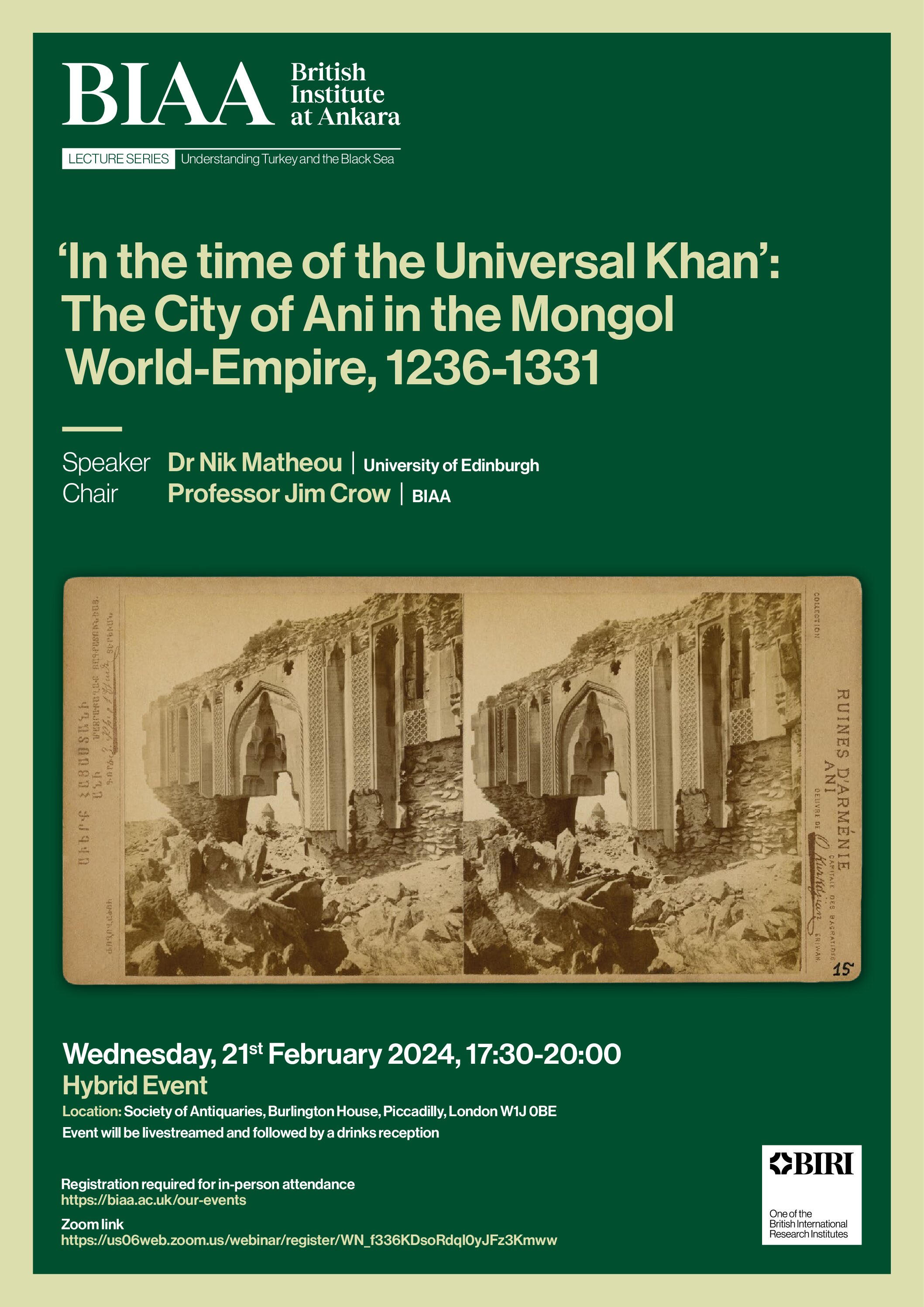
Location Society of Antiquaries, Burlington House, Piccadilly, London W1J 0BE
Date and time
Wednesday 21 February 2024
17:30 - 20:00 (London GMT)
20:30 - 23:00 (Ankara UTC+3)
Speakers
Dr Nik Matheou
University of Edinburgh
The now abandoned city of Ani straddles the borders between the contemporary republics of Turkey and Armenia, the above ground remains sitting in a nook of the Akhurian/Arpaçay river on the Turkish side of the border enclosed within an impressive double-circuit of walls. These structures stand as testament to an urban centre of many tens of thousands of people that lasted for some half a millennium, a tiny proportion of the buildings that once stood in this, the ‘city of 1001 churches’. Adorning the structures are lines upon lines of inscriptions, the overwhelming majority in Armenian but also including Arabic, Georgian and Persian, which taken together transform the site into an archive in stone, tracking its social history across five centuries.
The study of Ani has been atomised among various fields that each focus on particular time periods, whether the early royal Armenian era, the period as a Muslim emirate following Seljuq conquest, or as part of the Armenian vassal principality in the Georgian pan-Caucasian empire. Only a handful of economic historians have addressed the city’s trajectory as a whole, in studies focused on its position in wider trade networks. In this lecture, then, I’ll focus on one of the lesser studied periods, it’s final 100 years as a significant centre when the site was part of the Mongol world-empire. This period is often characterised as one of uniform decline brought about by the Mongol sack and subsequent emigration, another example of the historiographical tendency to catastrophise Mongol rule. In line with recent revisions in Mongol historiography, however, Ani demonstrates a much more interesting story than nomadic misrule. At the outset of the period we find a city dominated by a precociously coherent mercantile elite, only superficially governed by their nominal aristocratic overlords and distant Georgian monarchs.
With Mongol conquest this elite became part of the largest single political and economic system yet known to humanity, a much more profound and transformative experience than the initial sack. By the time the Iranian and Anatolian Ilkhanate emerged with the transformation of the Chinggisid world-order in the second half of the thirteenth century the city was deeply intertwined with Mongol rule, its elites becoming the ruler’s intimates and used as diplomats as far off as Western Europe, and by the early fourteenth century the city had become the ilkhan’s personal estate. Ultimately, then, we’ll find that Ani’s end was far less a product of “mis”rule, than it was a contingent outcome of the effectiveness and complexity of Chinggisid statecraft, with important lessons for understanding Mongol Eurasia as a whole, and the place of the Mongol world-empire in the making of modernity.
This event will be livestreamed and followed by a drinks reception.

Nicholas Matheou is an economic and social historian, and lecturer in Global Medieval History at the University of Edinburgh. At the core of his research sits eastern Anatolia, Upper Mesopotamia and south Caucasia as a world region, and Armenian material as a crucially decentred and decolonising window onto medieval Afro-Eurasia. Nicholas’s current research project is titled “The Fate of Unjust Cities”: Commercial Revolution, Global History & the Abandoned City of Ani, 900-1400.